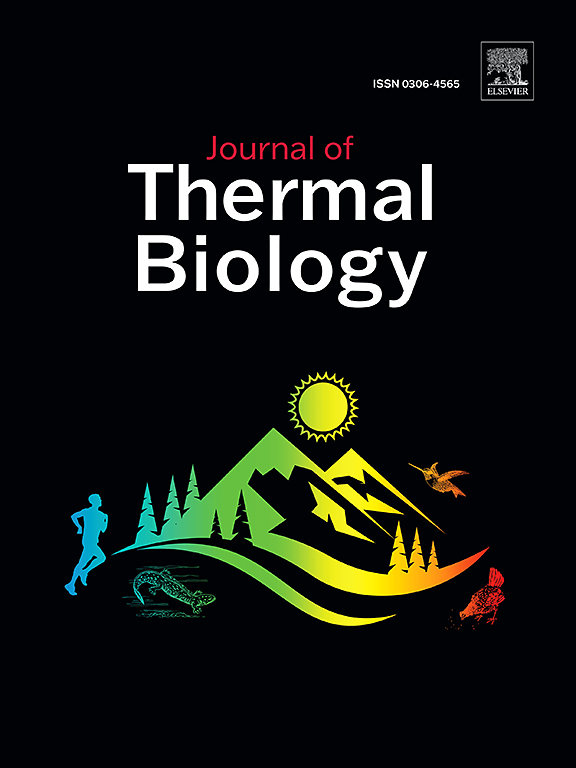Rutin alleviates heat stress induced hepatic abnormal lipid metabolism of broilers via improving antioxidant capacity to maintain mitochondrial homeostasis
IF 2.9
2区 生物学
Q2 BIOLOGY
引用次数: 0
Abstract
Heat stress (HS) leads to abnormal lipid metabolism in broilers, while rutin as a natural flavonoid with multiple biological functions shows potential to regulate antioxidant capacity and lipid metabolism. Therefore, this study aimed to investigate the effects of rutin supplementation on antioxidant and lipid metabolism functions in heat-stress broilers and to further explore its potential mechanisms. A total of 192 male broilers were randomly divided into three groups and treated with normal control (CON), heat stress (34 °C, HS), and HS with 500 mg kg−1 rutin supplementation (HS + Rutin), respectively. The results showed that dietary supplementation of 500 mg kg−1 rutin could significantly reverse the HS-induced liver damage. Rutin also mitigated HS-induced increases in liver triglyceride content and decreases in high-density lipoprotein and fatty acid binding protein contents. This might be achieved by increasing the expression of PPARα and decreasing the expression of SREBP1, which regulated the expression of downstream factors (such as CPT1, ACOX1, and ACC). Compared with the HS group, rutin increased mitochondrial DNA copy number and maintained mitochondrial homeostasis by regulating the expression of related genes (such as AMPK, PGC1-α, and SIRT3). In addition, rutin increased the activity of antioxidant enzymes, decreased the content of malondialdehyde, and activated the nuclear respiratory factor 2 (Nrf2) signaling pathway in the liver, which alleviated HS-induced oxidative stress. The effect of rutin in alleviating abnormal lipid deposition in HS broiler livers were correlated with indicators that reflected the antioxidant capacity and mitochondrial homeostasis. In conclusion, dietary 500 mg kg−1 rutin alleviates heat stress-induced hepatic abnormal lipid metabolism of broilers via improving antioxidant capacity to maintain mitochondrial homeostasis.
芦丁通过提高抗氧化能力,维持线粒体稳态,减轻热应激诱导的肉仔鸡肝脏脂质代谢异常
热应激导致肉仔鸡脂质代谢异常,而芦丁作为一种具有多种生物学功能的天然类黄酮,具有调节肉仔鸡抗氧化能力和脂质代谢的潜力。因此,本试验旨在研究添加芦丁对热应激肉鸡抗氧化和脂质代谢功能的影响,并进一步探讨其可能的机制。选取192只肉鸡,随机分为正常对照组(CON)、热应激组(34℃,HS)和热应激组(HS +芦丁)+ 500 mg kg−1芦丁组。结果表明,饲粮中添加500 mg kg−1芦丁可显著逆转hs诱导的肝损伤。芦丁还减轻了hs诱导的肝脏甘油三酯含量的增加和高密度脂蛋白和脂肪酸结合蛋白含量的降低。这可能是通过增加PPARα的表达和降低SREBP1的表达来实现的,SREBP1调节下游因子(如CPT1、ACOX1和ACC)的表达。与HS组相比,芦丁通过调节相关基因(如AMPK、PGC1-α、SIRT3)的表达,增加线粒体DNA拷贝数,维持线粒体稳态。芦丁还能提高抗氧化酶活性,降低丙二醛含量,激活肝脏核呼吸因子2 (Nrf2)信号通路,减轻hs诱导的氧化应激。芦丁缓解HS肉鸡肝脏异常脂质沉积的作用与反映抗氧化能力和线粒体稳态的指标相关。由此可见,饲粮500 mg kg−1芦丁可通过提高抗氧化能力,维持线粒体稳态,缓解热应激诱导的肉仔鸡肝脏脂质代谢异常。
本文章由计算机程序翻译,如有差异,请以英文原文为准。
求助全文
约1分钟内获得全文
求助全文
来源期刊

Journal of thermal biology
生物-动物学
CiteScore
5.30
自引率
7.40%
发文量
196
审稿时长
14.5 weeks
期刊介绍:
The Journal of Thermal Biology publishes articles that advance our knowledge on the ways and mechanisms through which temperature affects man and animals. This includes studies of their responses to these effects and on the ecological consequences. Directly relevant to this theme are:
• The mechanisms of thermal limitation, heat and cold injury, and the resistance of organisms to extremes of temperature
• The mechanisms involved in acclimation, acclimatization and evolutionary adaptation to temperature
• Mechanisms underlying the patterns of hibernation, torpor, dormancy, aestivation and diapause
• Effects of temperature on reproduction and development, growth, ageing and life-span
• Studies on modelling heat transfer between organisms and their environment
• The contributions of temperature to effects of climate change on animal species and man
• Studies of conservation biology and physiology related to temperature
• Behavioural and physiological regulation of body temperature including its pathophysiology and fever
• Medical applications of hypo- and hyperthermia
Article types:
• Original articles
• Review articles
 求助内容:
求助内容: 应助结果提醒方式:
应助结果提醒方式:


